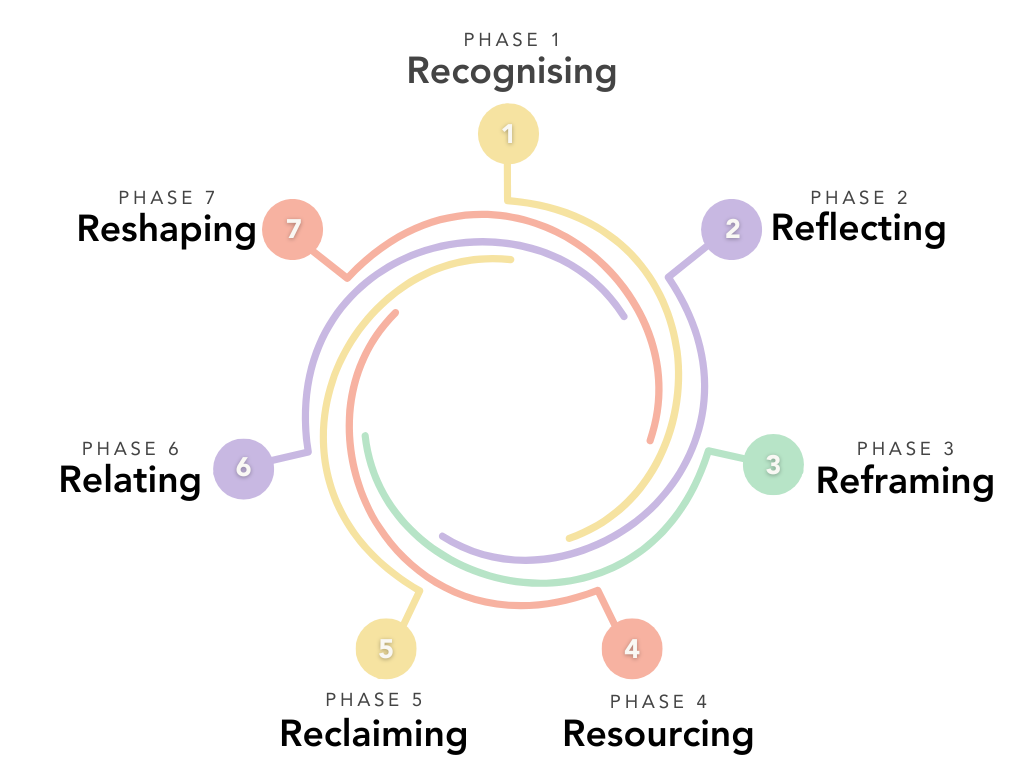Disclaimer: This quiz is intended for reflection and self-discovery purposes only. It is not a diagnostic tool and does not constitute clinical advice, a mental health assessment, or a substitute for therapy. If you’re experiencing significant distress or are unsure about your mental health needs, please consult a registered professional or mental health provider in your area. Your responses are confidential and will never be shared or sold. By taking this quiz, you acknowledge that the content is offered for educational and informational purposes only.
Introduction: Reimagining the ADHD Journey
For years, many defined ADHD by what it lacks-attention, focus, and organisation. However, when you look more closely, you discover a different story. Neurodivergent-affirming research, lived experience, and compassionate therapeutic practice reveal that people with ADHD possess creativity, resilience, and unique strengths. Rather than just managing symptoms, you can truly understand yourself, build on your strengths, and create a life that fits you.
That’s where Wired for Wonder: An ADHD Self-Discovery Journey and the Unfolding Framework come in. These seven steps guide you from self-doubt to self-acceptance, drawing on evidence-based tools and a deeply person-centred, strengths-focused approach. Let’s explore each phase in detail.

Why a New Framework?
Traditional models of ADHD tend to focus on impairment: what is ‘wrong’, what needs to be controlled, or how to appear more ‘normal’. But evidence and experience show this approach is not enough – and often, it is actively harmful. As seen in the growing neurodiversity movement, and supported by emerging research in psychology and therapy, what is needed is an approach that centres lived experience, honours agency, and cultivates self-compassion.
The Unfolding Framework grew out of first-hand accounts and interpretative research with therapists and adults with ADHD, who articulated what truly helps:
-
Radical acceptance
-
Contextual understanding
-
Building on strengths
-
Opportunities for agency and voice
-
The power of safe, supportive relationships
The Seven Unfolding Steps: From Surviving to Thriving

Phase 1: Recognising - Naming your lived experience
To begin, you must recognise your own experience. This involves noticing patterns, challenges, and gifts that may have gone unnoticed or unnamed for years. By actively recognising your story, you validate both the struggles and the strengths that shape your ADHD journey.
For example, you might ask yourself, “When did I first notice I was different?” or “How have I adapted over the years?” Through journaling or guided reflection, you give yourself permission to see your whole story – not just the parts that have been labelled as problematic.
Evidence & Lived Experience:
Masking is a protective response to stigma and misunderstanding, but over time, it can erode self-esteem and sense of self. Research shows that bringing these hidden parts into the open (unmasking) is the first step in healing internalised shame and starting the journey towards self-acceptance.
Practical Tools:
Guided journaling prompts: “When do I feel most myself?”
Psychoeducation on masking and stigma
Validation exercises (“It makes sense I learned to hide these parts to stay safe”).

Phase 2: Reflecting - Understanding Your Context and Story
After recognition comes reflection. Now, you look deeper into your life’s context: your upbringing, environment, cultural background, and relationships. Reflecting allows you to see how external factors have influenced your self-understanding and shaped your view of ADHD.
During this phase, you might create a timeline of pivotal life events, highlight moments of resilience, or explore how cultural expectations impacted your self-perception. By reflecting on your story, you gain clarity and begin to separate your true self from others’ expectations.
Evidence & Lived Experience:
Person-centred research emphasises the importance of narrative – not just what you struggle with, but why and how. For many, recognising external factors (e.g., unsupportive environments, rigid school systems, lack of informed care) is empowering. It shifts blame from “something wrong with me” to “my needs weren’t understood or met”.
Practical Tools:
Timeline exercises (mapping key experiences)
Narrative reframing: “How would I see my childhood if ADHD was understood?”
Values exploration (identifying what matters to you, not just what you ‘should’ do)

Phase 3: Reframing - Seeing Yourself Through a New Lens
Next, it’s time to reframe your narrative. Instead of viewing ADHD only through the lens of struggle, you actively seek out your unique strengths. What if your creativity, intuition, or ability to think differently are assets, not deficits? Reframing shifts your self-talk from criticism to curiosity and appreciation.
For instance, rather than saying, “I’m disorganised,” you might reframe it as, “I have a unique approach to organisation that sometimes doesn’t fit traditional structures, but allows for creative solutions.” Reframing is not about ignoring challenges – it is about embracing your full potential and recognising your capacity for growth.
Evidence & Lived Experience:
Studies show self-concept in ADHD adults is often undermined by chronic misunderstanding. Therapeutic approaches that help surface and question limiting beliefs – using cognitive, narrative, and somatic methods – are associated with improved well-being and agency.
Practical Tools:
Self-compassion practices
‘Whose voice is this?’ inquiry (noticing which beliefs are truly yours)
Group/peer reflection (hearing from others breaks isolation)

Phase 4: Resourcing - Building Tools and Support Systems
As you reframe, you can begin resourcing. This step is about gathering the tools, strategies, and support that help you thrive. You may explore ADHD-friendly planning methods, learn self-regulation skills, or connect with supportive communities and professionals. Resourcing ensures you have what you need to move forward confidently.
You might experiment with time management tools, mindfulness practices, or peer support groups, adjusting and personalising until you find what genuinely helps you.
Evidence & Lived Experience:
Recent research highlights that people with ADHD excel in interest-driven environments, creative problem solving, and empathetic listening – especially when their traits are understood and affirmed. This approach isn’t about pretending everything is positive – it’s about truthfully recognising and celebrating your unique abilities.
Practical Tools:
-
Inventory of ADHD strengths
-
Affirmation cards and daily reminders
-
“Strengths spotting” in daily life

Phase 5: Reclaiming - Owning Your Narrative and Identity
At this pivotal stage, you actively reclaim your ADHD identity. Instead of seeing ADHD as something that “owns” you or limits your potential, you take back your narrative. This involves embracing your neurodivergence as a valid part of who you are – not a flaw, but an essential and meaningful aspect of your identity.
Reclaiming means setting the terms for how you talk about your experiences. You decide what to share, how much to disclose, and what supports you choose to access. Through this process, you build self-advocacy skills, strengthen self-worth, and begin to integrate all parts of yourself with confidence.
Evidence & Lived Experience:
Informed by Standpoint Epistemology and neurodiversity theory, reclaiming your story is a power shift. It means you decide how to talk about your neurotype, how much to share, and what support you want. This is deeply protective against stigma and ‘imposter syndrome’.
Practical Tools:
Identity statements (“I am…”, “ADHD is part of my wiring, not a flaw”)
Self-advocacy scripts for work or family
Community connection and storytelling
Phase 6: Relating - Strengthening Connections and Community
Relating is the phase where you focus on relationships – with yourself, with others, and with your wider community. Building supportive, affirming relationships is essential for well-being, especially for neurodivergent adults who have often felt misunderstood.
You can practise setting healthy boundaries, seek out like-minded communities, or deepen existing relationships through vulnerability and self-advocacy. As you strengthen these connections, you will likely notice increased confidence and a stronger sense of belonging.
Evidence & Lived Experience:
Therapists and adults with ADHD report that attuned, accepting relationships are transformative. Hyperfocus and deep empathy, common in ADHD, can be assets in meaningful relationships – but vulnerability and trust are essential.
Practical Tools:
Peer support groups (online or in person, e.g. Unlocking ADHD)
Scripts for boundary-setting
‘Finding your people’ checklist
Phase 7: Reshaping- Designing Your ADHD-Friendly Life
Finally, you enter the phase of reshaping. Here, you actively redesign your routines, environments, and goals to fit your needs – not the other way around. Reshaping invites you to create a life that honours your neurodivergent identity, celebrates your strengths, and allows you to thrive.
You might adjust your work schedule, develop new hobbies, or establish routines that reflect your values and interests. With each small step, you move closer to a life that feels authentically yours.
Evidence & Lived Experience:
Strengths-based and person-led approaches are associated with increased quality of life for ADHD adults. Creating environments that support interest, challenge, and autonomy are key for sustainable well-being.
Practical Tools:
-
Vision boards and life design exercises
-
Customising routines (with permission to experiment and iterate)
-
Celebrating wins, no matter how small
Why These Steps Matter (and Why They Are Not Linear)
Each phase is distinct, yet together they form a flexible, cyclical framework. You might return to earlier phases as your life evolves, or focus on one area that needs more attention. Importantly, this journey honours your agency, celebrates your strengths, and invites you to see yourself through a more compassionate, empowered lens.
At the heart of Wired for Wonder and The Unfolding Framework is this core message:
You are not broken.
Your brain is not a problem to solve.
You deserve to understand yourself, feel supported, and take up space as you are.
Frequently Asked Questions
No. The Unfolding Framework is relevant for anyone who recognises themselves in the ADHD/ neurodivergent experience, whether diagnosed, self-identified, or just exploring. All are welcome.
This approach is neurodivergent-affirming and trauma-informed. It moves away from ‘fixing’ and towards understanding, agency, and strengths. The tools are practical, flexible, and rooted in both evidence and real-world lived experience.
That’s normal. Healing and unlearning takes time. You are encouraged to go at your own pace, revisit steps as needed, and seek support – through community, coaching, or therapy – whenever helpful.
Ready to Begin Your Unfolding Journey?
If you are ready to move from self-doubt to self-understanding, or want support in navigating the complexities of ADHD as an adult, you don’t have to do it alone.
At Therapeutic Space, you’ll find:
-
Group workshops and guided self-discovery sessions
-
The Wired for Wonder workbook and resource hub (coming soon)
-
A welcoming, judgment-free space (online and in Singapore)
Take your next step:
-
Book a free discovery call
- Volunteer to test the beta version of Wired for Wonder
Start Unfolding: Your Story Matters
You deserve a life that fits you – not the other way round. Let’s unfold together.
If you’re ready, get in touch here.
References/Bibliography:
Ho, E. R. Y. (2022). “I found it to be helpful to be real”: An Interpretative Phenomenological Analysis of Experiences of Therapists with ADHD.
Sedgwick, J. A., Merwood, A., & Asherson, P. (2019). The positive aspects of attention deficit hyperactivity disorder: a qualitative investigation of successful adults with ADHD. ADHD Attention Deficit and Hyperactivity Disorders, 11, 241–253.
Hallowell, E., & Ratey, J. (2021). ADHD 2.0: New Science and Essential Strategies for Thriving with Distraction. Ballantine Books.
Chapman, R., & Botha, M. (2022). Neurodivergence-informed therapy. Developmental Medicine & Child Neurology, 1-8.
- April 1, 2025
- Elena H
- 12:23 am

